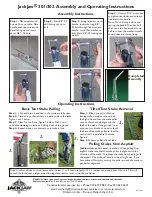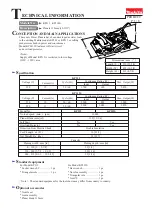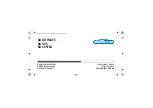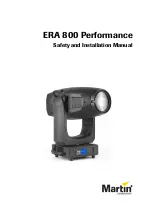
G-1
Appendix G
True RMS Measurements
Introduction
The instrument measures the true value of ac voltages. In physical terms, the rms (root-
means-square) value of a waveform is the equivalent dc value that causes the same
amount of hear to be dissipated in a resistor. True rms measurement greatly simplifies
the analysis of complex ac signals. Since the rms value is the dc equivalent of the
original waveform, it provides a reliable basis for comparing dissimilar waveforms.
Effect of Internal Noise in AC Measurements
With the input shorted and the channel set for ac volts (VAC) measurement, internal
amplifier noise causes a typical display reading of approximately 0.50 mv ac. Since the
instrument is a true rms responding measurement device, this noise contributes
minimally to the readings at the specified floor of each range. When the rms value of the
two signals (internal noise and range floor) is calculated, the effect of the noise is shown
as:
Total rms digits = Square Root of (0.50
2
+ 15.00
2
) = 15.008
The display will read 15.01. At the 28.00 mV input level on the 300.00 mV range in the
slow rate, the display will read 28.00 with no observable error.
Waveform Comparison (True RMS VS Average Responding)
Figure H-1 illustrates the relationship between ac and dc components for common
waveforms and compares readings for true rms measurements (Hydra) and average-
responding measurements. For example, consider the first waveform, a 1.41421V (zero-
to-peak) sine wave. Both the instrument and rms-calibrated average-responding
measurement devices display the correct rms reading of 1.0000V ac (the dc component
equals ). However, consider the 2V (peak-to peak) square wave.
Both types of measurement correctly display the dc component (0V), but the instrument
also correctly measures the ac component (1.0000V). The average-responding device
measures 1.11V, which amounts to an 11% error.
Average-responding measurement devices have been in use for a long time; you may
have accumulated test or reference data based on such instruments. The conversion
factors in Figure G-1 can help in converting between the two measurement methods.
Summary of Contents for 2635A
Page 8: ...2635A Users Manual vi...
Page 26: ...2635A Users Manual xxiv...
Page 29: ...Preparation for Use Introduction 1 1 3...
Page 50: ...2635A Users Manual 1 24...
Page 53: ...Front Panel Operations Summary of Front Panel Operations 2 2 3...
Page 88: ...2635A Users Manual 2 38...
Page 180: ...2635A Users Manual 5 10...
Page 212: ......
Page 234: ...2635A Users Manual B 4...
Page 250: ...2635A Users Manual D 8...
Page 251: ...E 1 Appendix E 8 Bit Binary Coded Decimal Table...
Page 264: ...Hydra Memory Card Record DATA FILES SET UP FILES DATxx Application Note SETxx Application Note...
Page 268: ...2635A Users Manual 4...








































